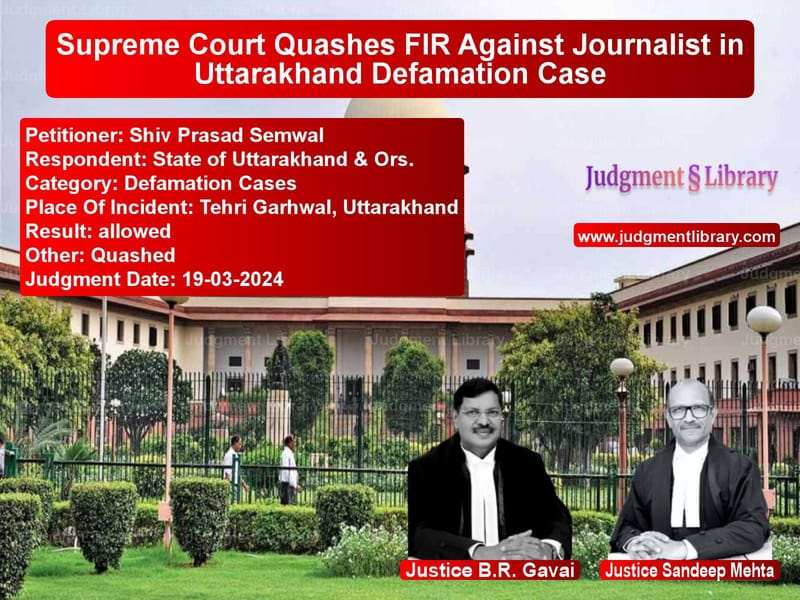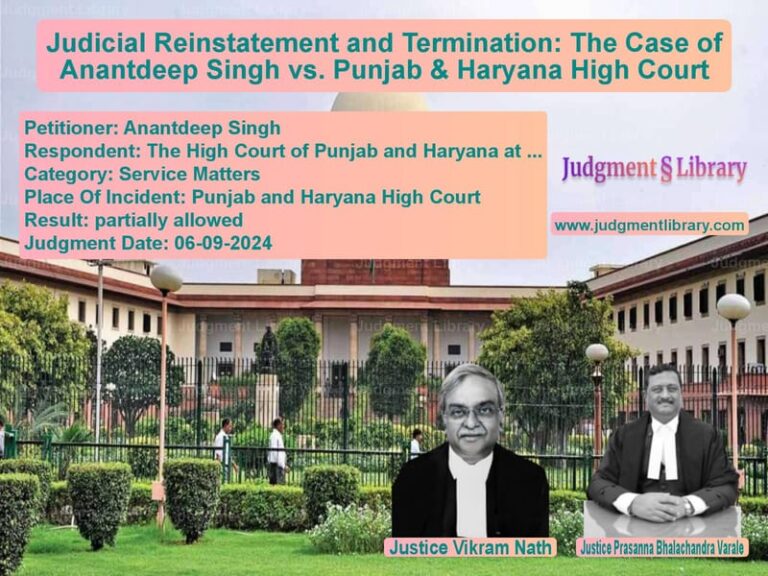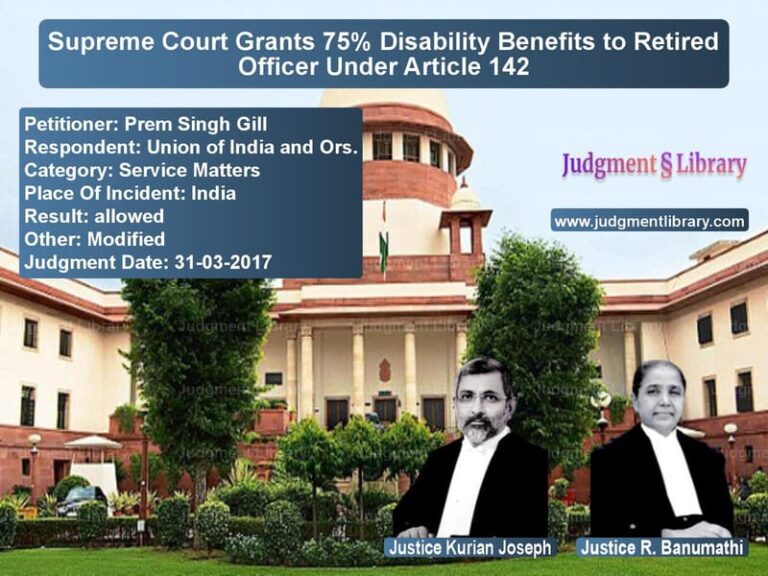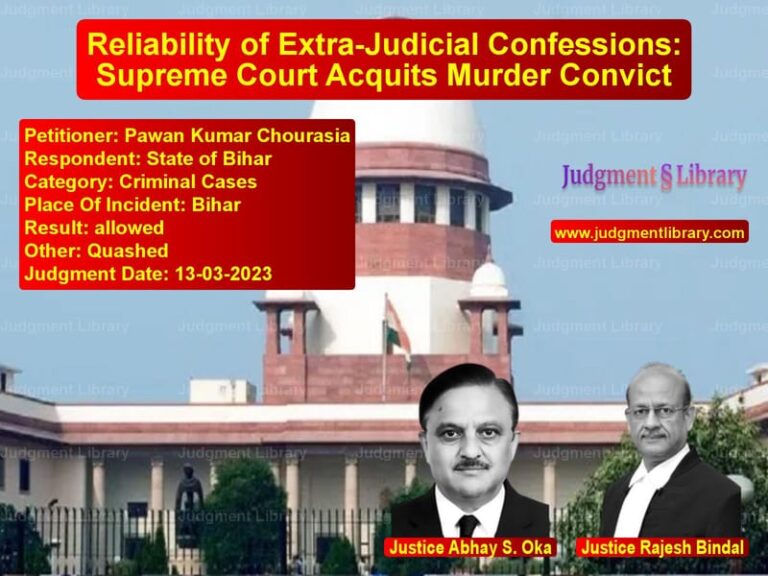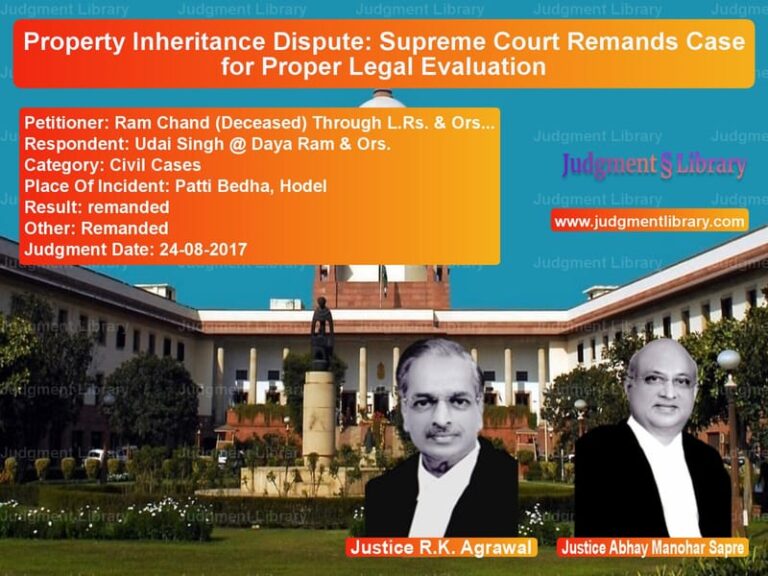Supreme Court Quashes FIR Against Journalist in Uttarakhand Defamation Case
The Supreme Court of India has delivered a significant ruling in the case of Shiv Prasad Semwal vs. State of Uttarakhand & Ors., addressing the misuse of defamation laws and the importance of protecting journalistic freedom. The Court quashed an FIR registered against the appellant, a journalist, under various sections of the Indian Penal Code (IPC), ruling that the allegations did not constitute a cognizable offense.
Background of the Case
The case stemmed from a news article published in the e-newspaper Parvatjan on March 17, 2020. The article questioned the legality of a land transaction in Tehri Garhwal, where a foundation stone ceremony was to be held by the then Chief Minister of Uttarakhand. The complainant, Rajeev Savara, alleged that the article falsely claimed he had encroached on government land, damaging his reputation.
On the basis of this complaint, an FIR (No. 31 of 2020) was registered at P.S. Muni Ki Reti under the following sections of the IPC:
- Section 153A – Promoting enmity between different groups
- Section 500 – Defamation
- Section 501 – Printing defamatory material
- Section 504 – Intentional insult to provoke breach of peace
- Section 120B – Criminal conspiracy
The appellant, Shiv Prasad Semwal, moved the Uttarakhand High Court seeking to quash the FIR. However, the High Court dismissed his plea on July 20, 2020, leading him to appeal before the Supreme Court.
Arguments by the Appellant
Shiv Prasad Semwal’s counsel contended that:
- The news article was based on a Facebook post by journalist Gunanand Jakhmola and did not originate from the appellant.
- The article did not incite hatred or enmity between any groups, failing the test for Section 153A IPC.
- The complainant’s remedy, if he felt defamed, lay in a civil defamation suit rather than a criminal case.
- The FIR was a deliberate attempt to muzzle press freedom and silence critical reporting.
Arguments by the Respondent (State of Uttarakhand)
The State argued that:
- The article falsely alleged that government land was encroached upon, misleading the public.
- The news piece incited discontent between people from hill areas and plains, violating Section 153A IPC.
- The appellant’s role in publishing the article made him responsible for its defamatory content.
- Proceedings should not be quashed at the initial stage without a full investigation.
Supreme Court’s Observations and Judgment
1. No Grounds for Section 153A IPC
The Supreme Court emphasized that to invoke Section 153A, an act must promote enmity between different groups based on religion, race, place of birth, or language. The Court ruled:
“There is no reference to any religious, racial, or linguistic group in the article. The publication focuses solely on the complainant’s land transaction and does not incite hatred between groups.”
2. No Intentional Insult Under Section 504 IPC
The Court found that the complainant failed to establish how the article provoked a breach of peace:
“There is no indication that the complainant or anyone else was provoked to violence or any unlawful act due to the article.”
3. Defamation Should Be Pursued Through Civil Remedies
The Court held that the remedy for defamation lies in civil law, not criminal prosecution, stating:
“If the complainant felt aggrieved, he should have pursued a civil suit for damages rather than invoking criminal law.”
4. Protecting Journalistic Freedom
The judgment reinforced the need to protect journalists from frivolous criminal cases:
“The right to free speech includes critical reporting on public interest issues. Criminalizing such reporting amounts to an undue restriction on press freedom.”
5. Quashing the FIR
The Supreme Court concluded:
“Allowing continuance of the proceedings pursuant to the impugned FIR is nothing but gross abuse of process of law. The FIR and all proceedings against the appellant are hereby quashed.”
Implications of the Judgment
This ruling sets a strong precedent for protecting journalistic freedom and preventing misuse of defamation laws:
- Restricts misuse of Section 153A IPC: Courts must ensure that the section is not misused to target critical reporting.
- Affirms press freedom: Journalists cannot be criminally prosecuted for fair reporting.
- Clarifies defamation remedies: Civil suits, not criminal cases, are the appropriate avenue for defamation claims.
- Prevents chilling effect on media: Protects reporters from harassment through frivolous FIRs.
This ruling strengthens protections for journalists and ensures that criminal laws are not misused to suppress free speech.
Petitioner Name: Shiv Prasad Semwal.Respondent Name: State of Uttarakhand & Ors..Judgment By: Justice B.R. Gavai, Justice Sandeep Mehta.Place Of Incident: Tehri Garhwal, Uttarakhand.Judgment Date: 19-03-2024.
Don’t miss out on the full details! Download the complete judgment in PDF format below and gain valuable insights instantly!
Download Judgment: shiv-prasad-semwal-vs-state-of-uttarakhand-supreme-court-of-india-judgment-dated-19-03-2024.pdf
Directly Download Judgment: Directly download this Judgment
See all petitions in Civil Defamation
See all petitions in Criminal Defamation
See all petitions in Judgment by B R Gavai
See all petitions in Judgment by Sandeep Mehta
See all petitions in allowed
See all petitions in Quashed
See all petitions in supreme court of India judgments March 2024
See all petitions in 2024 judgments
See all posts in Defamation Cases Category
See all allowed petitions in Defamation Cases Category
See all Dismissed petitions in Defamation Cases Category
See all partially allowed petitions in Defamation Cases Category

